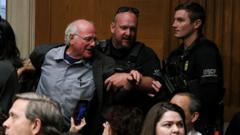Ben Cohen, co-founder of the renowned ice cream brand Ben & Jerry's, found himself in police custody following a protest in the US Senate regarding military assistance to Israel and the critical humanitarian crisis in Gaza. The incident took place during a hearing featuring Health and Human Services Secretary Robert F. Kennedy Jr., where demonstrators made their presence known, leading to nine arrests, including Cohen.
Video footage circulating on social media captured Cohen being escorted out of the Senate chamber with handcuffs securing his hands behind his back. In a subsequent statement, he voiced the urgency of the situation, declaring, "Congress kills poor kids in Gaza by buying bombs, and pays for it by kicking kids off Medicaid in the US."
Cohen faced charges related to crowding, obstructing, or creating a disturbance—typical charges cited in instances of civil disobedience within the capital. The other arrested protesters encountered more serious allegations, including assaults on law enforcement and resistance to arrest.
Since its inception in 1978, Ben & Jerry's has consistently engaged with socio-political advocacy, emphasizing issues such as climate change and LGBTQ+ rights. Following their acquisition by Unilever in 2000, the ice cream company maintained an independent board meant to uphold the brand’s foundational values.
However, tensions between Ben & Jerry's and Unilever have escalated, particularly since the ice cream company announced a halt to sales in the West Bank in 2021. This strained relationship has led to legal confrontations over management decisions and political activism. A representative for Unilever confirmed that Cohen's actions were personal pursuits rather than representing the brand's stance.
The ongoing legal turmoil and Cohen's recent protest activity highlight the persistent divide over the Israeli-Gaza conflict, with prominent voices from the corporate world taking a stand on pressing global humanitarian matters.
















